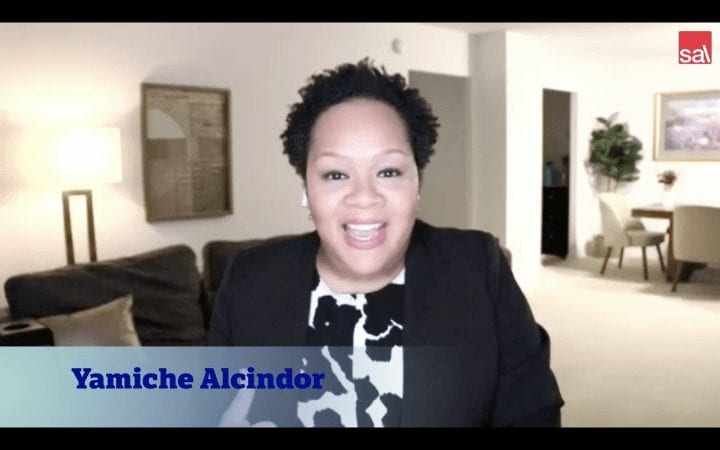
Where We Go From Here: A WITS Intern Reflects on Event with Yamiche Alcindor
November 23, 2020
Akshaya Ajith, a high school student doing a remote internship with the Writers in the Schools program at SAL, attended SAL’s Journalism Series event with Yamiche Alcindor on November 10. Alcindor is the White House correspondent for PBS NewsHour.
Read on to hear Akshaya’s reflections on truth, compassion, and connection—and what role they all play in journalism today.
By Akshaya Ajith, WITS Intern
Just three days after Joe Biden was projected to be President-elect of the United States and four years after Donald Trump’s America started to draw to a close, Yamiche Alcindor reminded us of what it means to be American in these deeply polarized times. Alcindor’s deeply memorable instances of questioning the President has lent her an enlightening grasp on the complicated relationship between journalism and our country.
Journalism is Alcindor’s “good trouble,” because at the center of the conflicted America around us are those hard-hitting questions that Alcindor is not afraid to ask. Her perspective and dedication to reporting on issues that affect so many vulnerable Americans while withstanding the derogatory insults hurled her way is a monument to the vitality of good journalism. Despite going toe-to-toe with the President of the United States, Alcindor “stay[s] focused on [her] true purpose.” In dealing with a “chaotic White House,” she said, it has become paramount to focus journalism on critical issues—like sending ventilators to Covid-19 hotspots and the seeming embrace of white nationalism on the national stage—rather than fall prey to the hyper-partisan rabbit holes that have multiplied in Donald Trump’s America.
We’ve seen much discussion of how media has fostered division in America. Americans participate in two very different media landscapes: that of Fox News or that of CNN. Both news outlets struggle to foster mutual understanding between Americans, and the opposite media worlds Americans have surrounded themselves in has created real-world consequences. But journalism like Alcindor’s, which focuses on American stories regardless of party lines, has proven to rebuild our connection to each other.
At its heart, journalism is—and should be—a way to elevate the stories of everyday Americans. Alcindor says that she finds that she “gravitates to ordinary Americans who want to talk about their lives.” Perhaps one of the most essential things journalism can accomplish is seeking out these ordinary stories and prompting a discussion about them. “Journalism’s role is to illuminate people’s lives,” Alcindor explains, “explaining people to other people.” Today, as people on both sides of the aisle lose their empathy for the other, as America’s divide seems to widen, and as we lose even the possibility of compromise, we are in dire need of this explanation. We are in dire need of a full portrait of America that doesn’t hide its flaws but holds empathy and compassion.
Alcindor’s stories center around compassion. Her work aims to help us understand each other through journalism, and she sees her role to be one of “a witness and voice to those who don’t have access to power.” It takes compassion to do important work for both your community and for all communities. As journalism seeks to uncover human stories that speak truth to a wider audience, compassion and empathy allow those stories to unite instead of divide. Empathy and compassion help journalists connect to people that seem different and broadcast that connection to their audience. “Compassion goes way past identity,” Alcindor says—and that’s what makes it so important in journalism.
Amid the increasing polarization and mistrust in media, compassion has become all the more significant. Despite the tumultuous relationship America has with the media, Alcindor continuously acknowledges that media can and must learn from its mistakes. “My job is to serve the American people,” she says, so the American people “should be questioning me about the job I am doing.” Media bias is inevitable, but perhaps one of the most important parts of journalism is learning from these mistakes, editing this first draft, and maintaining honesty. Alcindor reminds us that the only way to combat misinformation is to “put in the work.” We must “go into communities, tell stories, [and] hope people take in those stories” she says. As America reckons with the media’s biases, misinformation, and contribution to division, it is important to remember what journalism should be: compassionate, truthful, and illuminating. Journalism serves the American people: it provides us with information about the world we live in, it reminds us of who we are, as Americans, and it reminds us of who we could be.
Despite the inverted political and media landscapes in America, we will get better. We will get better because of journalism like Alcindor’s, that connects people across the country. We will get better because the “arc of the moral universe is long, but it bends towards justice” as long as we work steadfastly towards a more perfect union. We will get better, as we remind ourselves that knowing who we are is what makes us American.
 Akshaya Ajith is a sophomore at the Overlake School. She is the founder of The TimeTurner Project and the host of the TimeTurner Podcast. Akshaya has been a WITS student for three years and continues to work with SAL as a student journalist. Akshaya has written two published poems, “Imperfect” and “I,” with WITS as well as a short story featured in an anthology of student writing. Akshaya is passionate about promoting political awareness, community organizing, and working to find solutions to social issues. She continues to write in her free time.
Akshaya Ajith is a sophomore at the Overlake School. She is the founder of The TimeTurner Project and the host of the TimeTurner Podcast. Akshaya has been a WITS student for three years and continues to work with SAL as a student journalist. Akshaya has written two published poems, “Imperfect” and “I,” with WITS as well as a short story featured in an anthology of student writing. Akshaya is passionate about promoting political awareness, community organizing, and working to find solutions to social issues. She continues to write in her free time.